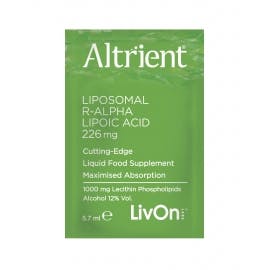How Does Alpha Lipoic Acid Work?
Alpha lipoic acid (otherwise known as ALA) is a powerful supplement that fights against free radical cells in your body. These are cells which have unpaired electrons – that will attack other molecules in order to achieve stability. When you they do this, it will damage the DNA of these molecules and spread disease.
Anti-oxidants help to combat free radicals. They are what the body uses as a defence system, stopping free radicals from setting off destructive chain reactions of harmful cell mutation which can lead to a number of chronic diseases such as cancer, Parkinson’s, heart disease and Alzheimer’s.
One of the most powerful free radical fighting anti-oxidants out there is Alpha Lipoic Acid, which is a substance that is naturally produced in your body and also absorbed from certain foods including spinach, red meat, potatoes, yams, broccoli, carrots, yeast and beets. Some doctors think that ALA has the potential to help slow down the aging process.
So how exactly does this substance work within your body? Let’s take a look at the way this fatty acid functions and the benefits that it can potentially offer.
How Does Alpha Lipoic Acid Function in the Body?
Alpha Lipoic Acid is a fatty acid that can either be taken as a supplement, absorbed from the foods you eat or produced by your body. When the ALA enters your body and binds to certain proteins, it will help to improve your metabolism by affecting the Krebs cycle, which is the process that your body uses to convert carbohydrates into energy. Unlike other anti-oxidants, ALA is fat and water soluble, which means that it will work all throughout your body.
The average human body usually produces enough ALA for its role, often in varying concentrations throughout all of your muscles and inner organs. However, if you can create an excess in your system that is more than the base amount your body needs – the extra will be free to work as an axi-oxidant. This means that it will circulate throughout your body and deactivate free radicals. It will also help to regenerate other beneficial anti-oxidants – such as Vitamin E and Vitamin C.
Alpha Lipoic Acid Decreases as You Age
As you get older, your levels of ALA will decrease. This is why taking ALA supplements is recommended to slow down the aging process. This supplement has been shown to offer a lot of great benefits, especially to the elderly. Many researchers have found that it keeps brain function healthy and stabilises the deterioration of the brain cells, even in patients with Alzheimer’s disease.
If you want to protect your brain health and keep yourself sharp up until old age, you might want to consider taking an ALA supplement as part of your daily routine.
What studies have been done on Alpha Lipoic Acid
Early animal studies show that ALA might help in treating Alzheimer’s and other degenerative diseases of the brain and nervous system.
Other studies have shown that a combination of ALA and other anti-oxidants have helped to regain appetite and weight in people recovering from illness.
Many studies have found that ALA has a beneficial effect on glucose metabolism, insulin sensitivity and diabetic neuropathy.
ALA supplements can also help to decrease the build-up of plaque within your arteries.
Another study has shown that ALA was effective in reducing the heart damage that was caused by drugs.
There have also been tests on rats which show that ALA is effective in helping to regulate metabolism and inhibit fat gain – but these effects have not been tested on humans yet so the effectiveness of this has yet to be determined.
Alpha Lipoic Acid is still being studied and there is a lot that scientists and nutritionists don’t know about it yet. It has a lot of potential and can be very good for the human body – perhaps even more than we know. Only time will tell what we discover about ALA and the benefits that it has to offer.


.jpg?auto=format&q=45&w=262&trim=auto)

